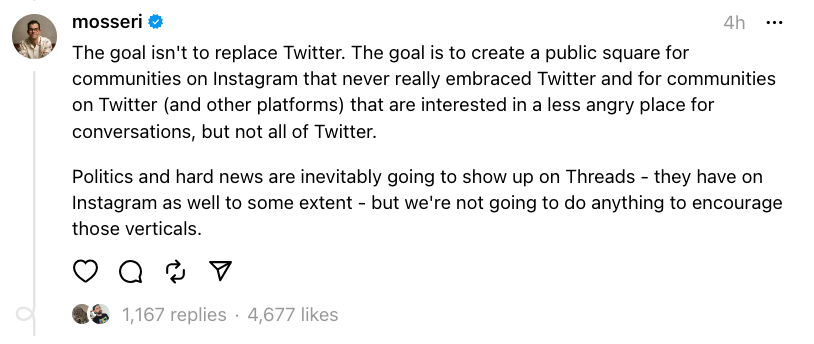Discover the best digital marketing tools, normally $27 as my free gift. SEO|Success
In the latest sign that Meta’s new Twitter lookalike Threads is unlikely to capture the essence of its predecessor, the company is apparently actively disinterested in cultivating its new app into a useful hub of breaking news and world events.
In a reply to a question from The Verge’s Alex Heath, Instagram head Adam Mosseri, currently the default hype guy for Threads too, said that Meta’s goal isn’t to replace Twitter, but rather “to create a public square for communities on Instagram that never really embraced Twitter and for communities on Twitter (and other platforms) that are interested in a less angry place for conversations, but not all of Twitter.”

He continued:
“Politics and hard news are important, I don’t want to imply otherwise. But my take is, from a platform’s perspective, any incremental engagement or revenue they might drive is not at all worth the scrutiny, negativity (let’s be honest), or integrity risks that come along with them.
There are more than enough amazing communities – sports, music, fashion, beauty, entertainment, etc – to make a vibrant platform without needing to get into politics or hard news.”
Mosseri’s take here is strange and fairly alarming for a few reasons. For one, it echoes some of the anodyne ways that Facebook has described itself over the years: just a big, friendly, neutral place where people could “connect” — Mark Zuckerberg’s favored pitch and one that conjures images of a male and female USB cable making love. Contrary to its stated neutrality, his company ritualistically incentivized particular forms of content and behavior, driving Facebook users deeper into ideological echo chambers while fanning the flames of the polarization and extremism that plagues global politics today.
As the former head of Facebook’s News Feed, Mosseri knows all of this, yet seems to be taking away the wrong lessons.
After being cowed by its embarrassing failures during the 2016 presidential election and its subsequent role in hosting the Stop the Steal movement, which culminated in the January 6 attack on the U.S. Capitol, Facebook opted to rebrand and retreat. It’s strange that Mosseri pretends that Meta’s desire for a social network floating in a vacuum, never influencing the world for the better or the worse, is in any way achievable.
Of course, “politics and hard news” will find their way onto Threads; they already have — see anti-LGBTQ hate group Libs of TikTok testing the waters there. Without Meta’s investment in or preparation for counterbalancing forces, extremism and viral misinformation will outcompete whatever legitimate news sources opt to invest resources in the new app.
Meta obviously has no interest in boosting journalism these days. The company has long been happy to extract what it wants from news orgs while offering bait and switch tactics in return, if that. Meta is currently blocking access to news in Canada to protest a new law that requires the tech giant to compensate publishers. (The company is currently worth $745 billion.)
Meta’s anti-journalism crusading aside, Mosseri’s take on the public square is squarely ahistorical.
Instagram and now Threads are obsessively designed to shuffle normal users together with brands, encouraging commercial activity at every turn. And while the lofty notion of a virtual public square or town hall is evoked often by social media execs to further the agenda of the day, public squares aren’t just the domain of trade and commerce. Historically, they’re also the heart of culture and a place for political discourse — itself a pesky and unavoidable side effect of existing within a society.
Surely Mark Zuckerberg — a self-styled Classics guy who named his children after Roman emperors — would know that the Roman Forum was not just a rustic shopping center but a place where people could gather, engage in political life and hear the news of the day.
Meta’s insistence on a diminished, commodified version of public life stuffed to the gills with advertising fits the company’s narrow vision, but it’s a disappointing if predictable turn for a promising Twitter successor to take so little interest in the world itself.
Meta’s vision for Threads is more mega-mall than public square by Taylor Hatmaker originally published on TechCrunch
source https://techcrunch.com/?p=2566500
No comments:
Post a Comment